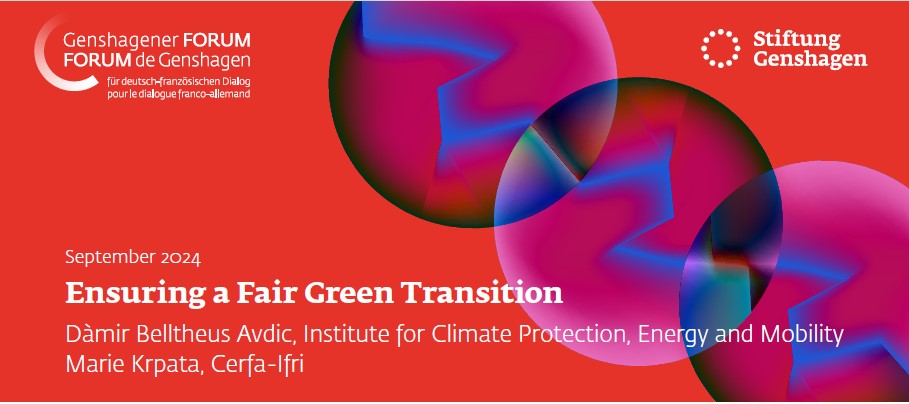Ensuring a Fair Green Transition
“Humanity has opened the gates of hell”, stated UN Secretary-General António Guterres at the Climate Ambition Summit in September 2023, emphasising that we are currently on a path of global warming above 2.4°C or even 2.9°C.

Despite this, climate action has faced headwinds in recent years, perhaps particularly in Europe. In the face of a context hostile to the structural changes necessary for the transition, which disparities should be urgently tackled? How can a fairer green transition be ensured? And, last but not least, what Franco-German perspectives are there on this issue?
This Paper resulted from a workshop at the 12th Genshagen Forum for Franco-German Dialogue (June 27 and 28, 2024) with the topic “Disintegrated Societies? The Future of Cohesion in Europe”.
Dàmir Belltheus Avdic, Head of Climate and Innovation Department, Institute for Climate Protection, Energy and Mobility (IKEM), Berlin.
Marie Krpata, Research Fellow, Study Committee on Franco-German Relations (Cerfa) at Ifri, Paris
- This publication is published on the Genshagen Website.

Available in:
Themes and regions
DOI
12th Genshagen Forum for Franco-German Dialogue, Genshagen Foundation, Berlin
Share
Related centers and programs
Discover our other research centers and programsFind out more
Discover all our analysesThe Franco-German Brigade and the Revival of European Defense
One thing has been clear since Donald Trump's return to the White House: the very existence of the European unification project is threatened. Unless it develops a sovereign defense policy to counter the war in Ukraine and the weakening of American security guarantees, the European Union will continue to see its internal cohesion and external attractiveness wane.
Friedrich Merz and the Zeitenwende 2.0. A “New Era” for Transatlantic Relations?
On February 23, 2025, almost 60 million voters were called upon to elect a new Bundestag. These elections will also give rise to a new government in Europe's largest economy.
After the Elections: Germany in Search of Shaken Stability?
With a voter turnout of 82.5%, Germany recorded its highest participation since 1987—an increase of 6.1 percentage points compared to 2021. As in the previous election, the high turnout particularly benefited the Alternative for Germany (AfD), which was able to mobilize many former non-voters. Many voters sought to punish the outgoing government with their ballots, as its approval rating had dropped to just 14% before the coalition broke apart in November 2024. Germany is now very likely heading toward a grand coalition between the CDU/CSU and the SPD, with exploratory talks having begun on February 28.
The German Greens as an Alliance Party: The End of an Illusion?
At the Wiesbaden Congress in November 2024, Robert Habeck, currently Minister for the Economy and Climate, was nominated as the Green Party’s candidate for the Chancellorship in the early parliamentary elections on February 23, 2025. The party, founded 45 years ago, is now firmly established in the German political landscape. Wishing to turn the page on an unloved ‘‘traffic light’’ coalition, the party is banking on a personal campaign and an optimistic discourse based on the energy transition and social justice.












